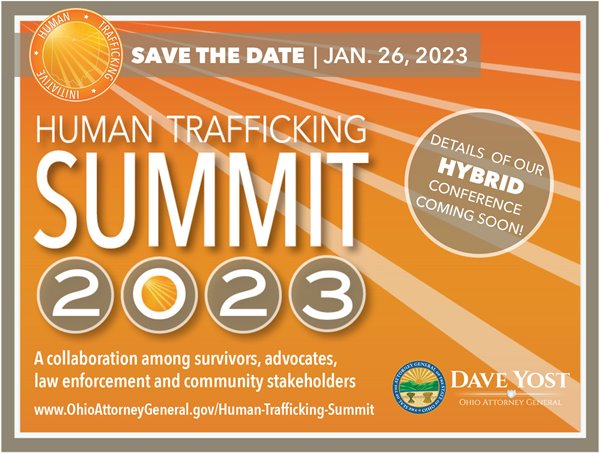Individuals and Families > Services for Victims > Human Trafficking Initiative > Human Trafficking Summit
2025 HT summit is set for July 30; proposals for breakout sessions are being sought

It’s official: The 2025 Human Trafficking Summit will take place on July 30, returning to the Hyatt Regency Columbus on a date the coincides with World Day Against Trafficking in Persons.
Ohio Attorney General Dave Yost and his Human Trafficking Initiative (HTI) team encourage survivors, social workers, health-care professionals, law enforcement officers, and other professionals to plan to join them this summer for the summit, which annually brings together community stakeholders who are committed to ending sex and labor trafficking in Ohio.
As planning continues for the event, now in its sixth year, the HTI team is seeking proposals for summit breakout sessions. A proposal packet – including suggested presentation formats and content, application guidelines and the application itself – can be found here.
The deadline for submissions is April 7, with selected presenters scheduled to be notified by April 25.
Since taking office in January 2019, Attorney General Yost has made the fight against human trafficking a top priority. He created the Human Trafficking Initiative to build awareness, empower Ohioans to take action in their communities, strengthen victim services throughout the state, and ensure that traffickers and “johns” are brought to justice.
The office introduced the summit as part of its overall efforts to help survivors achieve long-term healing on what AG Yost calls the Highway to Hope.
Check this site regularly for updates as the 2025 Human Trafficking Summit nears.

More than 1,400 people registered to attend the attorney general's second annual Human Trafficking Summit, which amounted to intense growth from the initial summit. The Jan. 14 event was held virtually due to COVID-19 concerns, and the agenda included:
- AG Yost celebrating the strides made in the human trafficking fight in 2020.
- A presentation from Nationwide Children's Hospital doctors about how trafficking affects young victims and how health-care and other systems can work together to reduce the toll.
- Fifteen workshop options with valuable information and resources, including "The Illicit Massage Industry: A Quick Look at the Chinese Supply Chain," "First Responses to Human Trafficking," "When Parents Are Pimps," "Considering a Dedicated Docket for Juvenile Human Trafficking? The Triumphant and Turbulent Tale of One Ohio Court’s Response" and "Lessons from Statewide Partnerships To Improve Outcomes for Children and Youth Victim Services."
The event was presented via the Whova app, and all summit presentations will continue to be available for three months on the web app and six months on the mobile app.
If you have questions, contact HTI@ohioattorneygeneral.gov. For technical issues with the app, contact support@whova.com.
Seven hundred people registered for the Ohio Attorney General’s inaugural Human Trafficking Summit on Jan. 9, 2020, at the Greater Columbus Convention Center. Speakers included Dr. Elaine Richardson, a survivor and Ohio State professor; state Sen. Teresa Fedor; and Attorney General Dave Yost. Workshops focused on labor trafficking, specialty court dockets, the story of how a nonprofit established safehouses and the importance of multidisciplinary teams in helping victims.